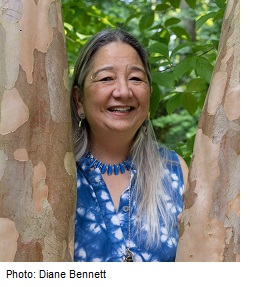
Stepping into the role of Executive
Director at the National Asian American Mental Health Association
(NAAPIMHA), Dr. Pata Suyemoto brings a wealth of experience, pulling
from her knowledge as a feminist scholar, writer, educator,
curriculum developer, diversity trainer, and mental health activist.
Beyond professional accolades, Dr. Suyemoto’s lived experience with
mental health challenges provides a compassionate and relatable
voice to those navigating their mental health journeys.
 Through
workshops like Mental Health First Aid, speaking engagements, and
collaborative projects, Dr. Suyemoto actively engages in initiatives
aimed at amplifying awareness and resources for mental health in the
AANHPI community. “As communities, as parents, as people who are
doing activist work, we have to start including mental health if
we're talking about health equity. It's not just diabetes and heart
conditions,” says Dr. Suyemoto.
Through
workshops like Mental Health First Aid, speaking engagements, and
collaborative projects, Dr. Suyemoto actively engages in initiatives
aimed at amplifying awareness and resources for mental health in the
AANHPI community. “As communities, as parents, as people who are
doing activist work, we have to start including mental health if
we're talking about health equity. It's not just diabetes and heart
conditions,” says Dr. Suyemoto.
Additionally, Dr. Suyemoto's approach acknowledges the unique
cultural and linguistic nuances within AANHPI communities,
recognizing the importance of tailoring conversations and resources
to address specific needs. As she aptly notes, "how those
conversations might look in AANHPI communities might be different,
in part because of some of the stigma, or in part because of some of
the language differences."
Another critical issue that Dr. Suyemoto would like to call
attention to is suicide prevention. Suicide is a leading cause of
death in AANHPIs aged 15-24, however, mental health and suicide
prevention is viewed as separate fields. “Suicide prevention is
really important, but in the field, mental health and suicide
prevention are separate, so the suicidology people don't necessarily
talk to mental health people. I think there's obviously overlap, but
they are field-wise, very separate.”
By working to destigmatize conversations surrounding mental
wellness, Dr. Suyemoto advocates for understanding and support
within the AANHPI community and tries to ensure that individuals
feel seen, heard, and valued in their journeys toward healing and
well-being.
Acknowledging the journey inherent in mental health
challenges, Suyemoto emphasizes the importance of self-care beyond
the surface level, advocating for holistic well-being encompassing
body, mind, and spirit. “I think most people who have mental health
challenges are on some kind of human journey.” explains Dr.
Suyemoto, “It's not like the flu where you get over it and then
you're better.”
“The concept of self-care is important. It’s not just spas. It’s
taking charge of mental health, taking the time to check in with
yourself.” continues Dr. Suyemoto, “Take a breath and see if you are
taking care of body, mind, and spirit. Cultivate activities that
nourish you; don’t let work take over.”
When asked about when to seek professional help, Dr. Suyemoto states
that it is a personal choice to do so and acknowledges that it isn’t
easy to find a therapist that aligns with your needs the first time
around. She suggests interviewing at least three mental health
professionals and asking questions. For example, Dr. Suyemoto
suggests asking things like:
Tell me about your training (Things like where they went to school, what they have special
training in, what degrees they have.)
What is/are your theoretical perspective(s)? (Although you may not understand everything they say, take notes, and then look up the perspectives.)
Do you have specific training in ___________________? (What issues are particular to you? For example: grief, trauma, eating disorders, elderly populations, late adolescent populations, etc.)What is your availability in a crisis or on the phone in between sessions?
“Doctors have a lot of power, so you need
agency over your own care,” she says, “If it’s not working, don’t
give up completely.”
For those who see a loved one struggling with mental health, Dr.
Suyemoto recommends listening non-judgmentally and providing a safe
space to talk. “If someone makes a comment or reaches out, take it
seriously,” she says, “And know your resources. You can call 988
[the Suicide and Crisis Lifeline] to get information on how to
help.”
By amplifying awareness, providing resources, and advocating for
systemic change, Dr. Suyemoto inspires individuals to prioritize
their mental health and seek support when needed. Her dedication to
destigmatizing mental illness and fostering resilience reflects a
profound commitment to promoting mental well-being within the AANHPI
community.
____________
Cover photo and photo by Diane Bennett

